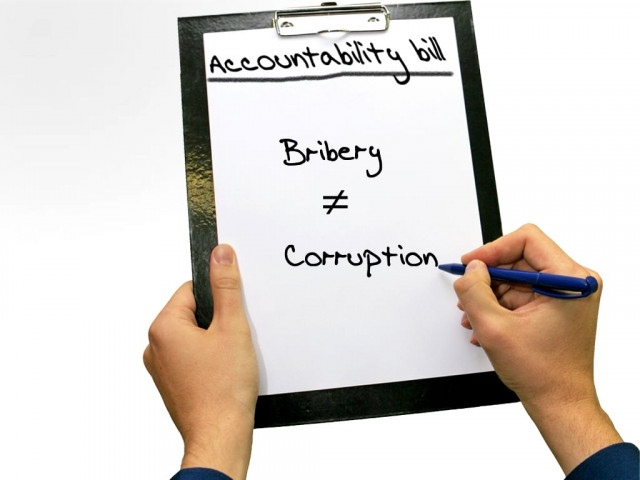Experts believe country should have one accountability body
Until that is not done, corruption would not be rooted out

Until that is not done, corruption would not be rooted out DESIGN: SUNARA NIZAMI
Khyber-Pakhtunkhwa is the first province to have passed its own anti-corruption law called K-P Ehtesab Commission Act. However, the Ehtesab Commission is not the only accountability body in the province.
At this stage, there are four accountability institutions working in the country. These include National Accountability Bureau, Federal Investigation Agency and Anti-Corruption Establishment.
“If the government truly wants to root out corruption once and for all, there should be a single institution that is free from political interference,” Qazi Jawwad Ihsanullah, a senior lawyer of the Peshawar High Court, told The Express Tribune.

Allegations are frequently levelled over the credibility of accountability institutions. According to insiders, politicians have a strong tendency to use these bodies as tools to victimise political opponents.
Legislation in province
However, experts in the field are not pleased with the manner in which corruption is being tackled within the province.
“NAB offers voluntary return and plea bargain like agreements while Ehtesab Commission has no such offers,” Qazi Jawwad said, disagreeing with the method. He called plea bargain and voluntary return illegal.
But as there is no plea bargain or voluntary return in the Ehtesab Commission law, most officers, after learning that they are being investigated, try to be arrested by NAB. “A person loots billions but signs a plea bargain agreement just to return a few millions is a question mark on the credibility of NAB,” Shumail Ahmad Butt, another senior lawyer of the Peshawar High Court, told The Express Tribune. “Legally, it may be right but ethically this is not fair.”
Though NAB claims it has recovered Rs237 billion in plea bargain and voluntary returns since its establishment, it has no record of how much has so far been looted.
A NAB prosecutor said it could recover around Rs2.3 billion through courts. Another flaw in the system is that Ehtesab Commission could restart an enquiry in an alleged corruption case against an official even if he is acquitted by NAB.
Qazi Jawwad was of the view that legal experts should be engaged to remove lacunas in accountability laws. In addition, investigation side should be strengthened and proper courses should be imparted to the investigation officers with a penalty in case they fail to prove charges.
In the past
To curb this social evil, Prevention of Corruption Act, 1947 was the first law introduced immediately after independence. After the 1947 corruption act, in 1958, the then dictator, General Ayub Khan, passed the Elected Bodies Disqualification Ordinance to pave the way for its cronies and disqualify mainstream politicians.
“The law aimed at preventing prominent politicians from participating in politics for 15 years,” Butt added. This way the government had reportedly banned around 6,000 politicians from participating in politics. Then came the Ehtesab Commission in 1996. It was formed by the Nawaz Sharif government. The Ehtesab Bureau was then formed in 1997.
The bureau would investigate while the commission’s job was prosecution. Then the National Accountability Ordinance, 1999 was passed by General (retd) Musharraf. But all these laws were promulgated by the federal government.
However, Pakistan was ranked 117th out of 175 on the Corruption Perceptions Index 2015 by Transparency International Pakistan with an average of 107.9 from 1995 till 2015.
Published in The Express Tribune, July 6th, 2016.













COMMENTS
Comments are moderated and generally will be posted if they are on-topic and not abusive.
For more information, please see our Comments FAQ